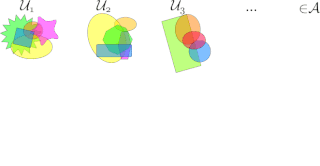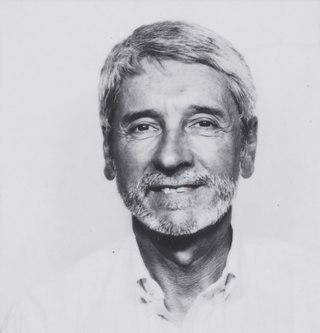Related Research Articles

Edward Witten is an American mathematical and theoretical physicist. He is a professor emeritus in the school of natural sciences at the Institute for Advanced Study in Princeton. Witten is a researcher in string theory, quantum gravity, supersymmetric quantum field theories, and other areas of mathematical physics. Witten's work has also significantly impacted pure mathematics. In 1990, he became the first physicist to be awarded a Fields Medal by the International Mathematical Union, for his mathematical insights in physics, such as his 1981 proof of the positive energy theorem in general relativity, and his interpretation of the Jones invariants of knots as Feynman integrals. He is considered the practical founder of M-theory.
R. H. Bing was an American mathematician who worked mainly in the areas of geometric topology and continuum theory. His father was named Rupert Henry, but Bing's mother thought that "Rupert Henry" was too British for Texas. She compromised by abbreviating it to R. H. Consequently, R. H. does not stand for a first or middle name.
Mary Ellen Rudin was an American mathematician known for her work in set-theoretic topology. In 2013, Elsevier established the Mary Ellen Rudin Young Researcher Award, which is awarded annually to a young researcher, mainly in fields adjacent to general topology.
In mathematics, in the field of topology, a topological space is called supercompact if there is a subbasis such that every open cover of the topological space from elements of the subbasis has a subcover with at most two subbasis elements. Supercompactness and the related notion of superextension was introduced by J. de Groot in 1967.

In the mathematical field of knot theory, the Dowker–Thistlethwaite (DT) notation or code, for a knot is a sequence of even integers. The notation is named after Clifford Hugh Dowker and Morwen Thistlethwaite, who refined a notation originally due to Peter Guthrie Tait.
In topology and related areas of mathematics, a topological space is a nodec space if every nowhere dense subset of is closed. This concept was introduced and studied by van Douwen (1993).

A set-valued function is a mathematical function that maps elements from one set, the domain of the function, to subsets of another set. Set-valued functions are used in a variety of mathematical fields, including optimization, control theory and game theory.
The mathematician Shmuel Aaron Weinberger is an American topologist. He completed a PhD in mathematics in 1982 at New York University under the direction of Sylvain Cappell. Weinberger was, from 1994 to 1996, the Thomas A. Scott Professor of Mathematics at the University of Pennsylvania, and he is currently the Andrew MacLeish Professor of Mathematics and chair of the Mathematics department at the University of Chicago.
Isbell conjugacy or Isbell duality is a fundamental construction of enriched category theory formally introduced by William Lawvere in 1986. That is a duality between covariant and contravariant representable presheaves associated with an objects of categories under the Yoneda embedding.

Ernesto Estrada is a Cuban-Spanish scientist. He has been Senior ARAID Researcher at the Institute of Mathematics and Applications at the University of Zaragoza, Spain since 2019. Before that he was the chair in Complexity Science, and full professor at the Department of Mathematics and Statistics of the University of Strathclyde, Glasgow, United Kingdom. He is known by his contributions in different disciplines, including mathematical chemistry and complex network theory.
In category theory, a discipline in mathematics, the notion of topological category has a number of different, inequivalent definitions.
Alexander Vladimirovich Arhangelskii is a Russian mathematician. His research, comprising over 200 published papers, covers various subfields of general topology. He has done particularly important work in metrizability theory and generalized metric spaces, cardinal functions, topological function spaces and other topological groups, and special classes of topological maps. After a long and distinguished career at Moscow State University, he moved to the United States in the 1990s. In 1993 he joined the faculty of Ohio University, from which he retired in 2011.
Alexander Chigogidze was a Georgian-born general topologist. Chigogidze is best known for his book Inverse Spectra, in which he passed on to the next generation of topologists the results of the Fedorchuk -Schepin Topology seminars held at the Moscow State University during the 1980s. The book also contains important contributions Chigogidze made in the area of General Topology and Geometric Topology. In the area of General Topology, Chigogidze developed extension theory for noncompact nonmetrizable spaces. In the area of Geometric Topology, Chigogidze introduced grading to shape theory by developing a theory n-Shape where n is an arbitrary integer. This was a major addendum to the existing n-Homotopy theory.

In mathematics, a selection principle is a rule asserting the possibility of obtaining mathematically significant objects by selecting elements from given sequences of sets. The theory of selection principles studies these principles and their relations to other mathematical properties. Selection principles mainly describe covering properties, measure- and category-theoretic properties, and local properties in topological spaces, especially function spaces. Often, the characterization of a mathematical property using a selection principle is a nontrivial task leading to new insights on the characterized property.
Ljubisa Dragi Rosanda Kocinac is a mathematician and currently a Professor Emeritus at the University of Niš, Serbia. His research interests include aspects of topology, especially selection principles, topological games and coverings of topological spaces, and mathematical analysis. In particular, he introduced star selection principles.
In mathematics, a Hurewicz space is a topological space that satisfies a certain basic selection principle that generalizes σ-compactness. A Hurewicz space is a space in which for every sequence of open covers of the space there are finite sets such that every point of the space belongs to all but finitely many sets .
In mathematics, a -space is a topological space that satisfies a certain a basic selection principle. An infinite cover of a topological space is an -cover if every finite subset of this space is contained in some member of the cover, and the whole space is not a member the cover. A cover of a topological space is a -cover if every point of this space belongs to all but finitely many members of this cover. A -space is a space in which every open -cover contains a -cover.
In general topology, a remote point is a point that belongs to the Stone–Čech compactification of a Tychonoff space but that does not belong to the topological closure within of any nowhere dense subset of .

Guido Mislin is a Swiss mathematician, academic and researcher. He is a Professor Emeritus of Mathematics at ETH Zurich. He is also associated with Ohio State University as a guest at Mathematics Department.

Dan Burghelea is a Romanian-American mathematician, academic, and researcher. He is an Emeritus Professor of Mathematics at Ohio State University.
References
- ↑ Marion Scheepers at the Mathematics Genealogy Project
- ↑ "Department of Mathematics". Set Theory and Logic at Boise State University. Retrieved 4 September 2019.
- ↑ Tuck, Kathleen (15 September 2016). "New Course Transcends Disciplinary Boundaries". College of Arts and Sciences. Retrieved 4 September 2019.
- ↑ "Vertically Integrated Projects". VIP BSU. 20 March 2019. Retrieved 4 September 2019.
- 1 2 "Selected Works of Marion Scheepers". Boise State University. Archived from the original on 25 September 2018. Retrieved 4 September 2019.
- ↑ "COAS Faculty over 25 Years of Service". College of Arts and Sciences. 7 May 2014. Retrieved 4 September 2019.
- ↑ Madrid, Cienna (13 June 2017). "Marion Scheepers". Boise State News. Retrieved 4 September 2019.
- ↑ "FRONTIERS OF SELECTION PRINCIPLES". FRONTIERS OF SELECTION PRINCIPLES. 1 September 2017. Retrieved 4 September 2019.